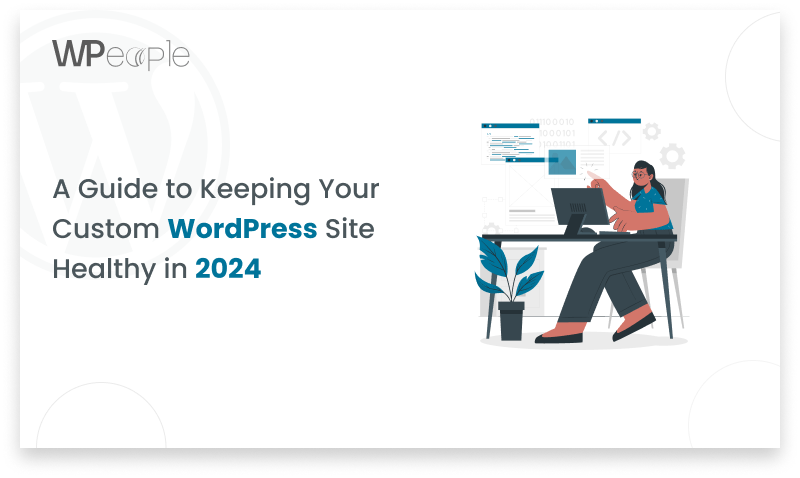As we move into 2024, the importance of search engine optimization (SEO) remains a critical component of a successful online presence. WordPress, as one of the most popular content management systems, offers a wide range of tools and plugins to help you optimize your site for search engines. To stay ahead of the competition, it’s crucial to adopt the latest SEO practices. This guide highlights the top SEO practices for WordPress users in 2024, ensuring your site ranks higher and attracts more organic traffic.

1. Optimize for Core Web Vitals
Google’s Core Web Vitals, which focus on user experience metrics like loading speed, interactivity, and visual stability, continue to play a significant role in search rankings. To optimize your WordPress site for Core Web Vitals, focus on improving page load times, minimizing layout shifts, and enhancing overall site responsiveness.
Start by choosing a lightweight and well-coded theme that reduces unnecessary bloat. Additionally, use a content delivery network (CDN) to deliver content faster to users based on their geographic location. Plugins like WP Rocket or NitroPack can also help you optimize your site’s performance by caching pages, optimizing images, and minifying CSS and JavaScript files.
2. Leverage Schema Markup
Schema markup, or structured data, helps search engines better understand your content and present it more effectively in search results. In 2024, leveraging schema markup is crucial for improving visibility in rich results, such as featured snippets, knowledge panels, and product listings.
WordPress plugins like Schema Pro or Yoast SEO make it easy to add schema markup to your site without requiring coding knowledge. Use schema markup to highlight important information, such as reviews, ratings, events, and product details, to enhance your search engine listings and improve click-through rates.
3. Prioritize Mobile-First Indexing
With the majority of web traffic coming from mobile devices, Google has fully transitioned to mobile-first indexing. This means that the mobile version of your site is now the primary version used for indexing and ranking. Therefore, it’s essential to ensure that your WordPress site is fully optimized for mobile devices.
Choose a responsive theme that automatically adjusts to different screen sizes and resolutions. Additionally, optimize images for mobile, use mobile-friendly fonts, and ensure that buttons and links are easily clickable on smaller screens. Test your site’s mobile performance using Google’s Mobile-Friendly Test tool and make necessary adjustments to enhance user experience.
4. Focus on High-Quality, Relevant Content
Content remains the cornerstone of SEO, and in 2024, the emphasis is on creating high-quality, relevant content that meets user intent. Search engines prioritize content that answers users’ queries effectively and provides valuable insights. To achieve this, conduct thorough keyword research to identify topics that resonate with your target audience.
When creating content, aim for comprehensive and well-structured articles that cover a topic in-depth. Use headings and subheadings to break up the content and make it easier to read. Additionally, incorporate multimedia elements like images, videos, and infographics to enhance engagement and provide a richer user experience. Regularly update your content to keep it fresh and relevant.
5. Optimize for Voice Search
As voice-activated devices become increasingly popular, optimizing your WordPress site for voice search is essential in 2024. Voice searches tend to be longer and more conversational, so focus on using natural language and answering common questions directly in your content.
To optimize for voice search, consider creating an FAQ section that addresses common queries related to your industry. Additionally, use long-tail keywords and phrases that people are likely to speak rather than type. Tools like AnswerThePublic can help you identify common voice search queries and incorporate them into your content strategy.
6. Improve Site Security with HTTPS
Site security is not only important for protecting user data but also plays a role in SEO. Google considers HTTPS as a ranking signal, so ensuring your WordPress site is secure with an SSL certificate is crucial. Most hosting providers offer free SSL certificates through services like Let’s Encrypt.
Once you have installed an SSL certificate, configure your site to use HTTPS rather than HTTP. Plugins like Really Simple SSL can make this process straightforward by automatically redirecting all traffic to the secure version of your site. A secure site not only boosts your search engine rankings but also builds trust with your visitors.
7. Optimize Images for SEO
Images play a significant role in enhancing user experience and engagement, but they can also impact your site’s loading speed if not optimized correctly. In 2024, image optimization remains a top SEO practice for WordPress users.
To optimize images, use descriptive filenames and include relevant keywords in the alt text. Compress images to reduce file size without compromising quality using plugins like Smush or ShortPixel. Additionally, consider using next-gen image formats like WebP, which offer better compression and faster loading times compared to traditional formats like JPEG and PNG.
8. Utilize Internal Linking
Internal linking is an effective SEO strategy that helps search engines understand the structure of your site and discover new content. By linking related posts and pages within your site, you can improve user navigation and distribute link equity, enhancing the overall SEO value of your site.
When creating content, look for opportunities to link to other relevant articles or pages on your site. Use descriptive anchor text that provides context to both users and search engines. Regularly audit your internal links to ensure they are working correctly and update them as needed to reflect changes in your content structure.
9. Enhance User Engagement Metrics
User engagement metrics, such as bounce rate, time on site, and pages per session, are increasingly important for SEO in 2024. Search engines use these metrics to gauge the relevance and quality of your content. To improve user engagement, focus on creating content that is engaging, informative, and visually appealing.
Encourage visitors to explore more of your site by including related posts, internal links, and clear calls to action. Additionally, make your site easy to navigate with a well-organized menu and a search bar. Monitor user engagement metrics using tools like Google Analytics and make data-driven adjustments to your content strategy.
10. Regularly Update and Audit Your Content
SEO is an ongoing process, and regularly updating and auditing your content is essential to maintaining and improving your search engine rankings. Content that was relevant a few years ago may no longer be accurate or valuable, so it’s important to review and refresh your content regularly.
Conduct a content audit to identify outdated or underperforming content. Update statistics, add new information, and improve the overall quality of the content. Removing or redirecting low-quality content can also improve your site’s overall SEO performance. By keeping your content up to date, you’ll ensure it continues to meet the needs of your audience and search engines.
Conclusion
In 2024, staying ahead in SEO requires a combination of technical optimization, high-quality content, and a focus on user experience. By implementing these top SEO practices on your WordPress site, you can improve your search engine rankings, attract more organic traffic, and achieve long-term success online. Keep up with the latest trends and continuously refine your strategy to stay competitive in the ever-evolving digital landscape.




